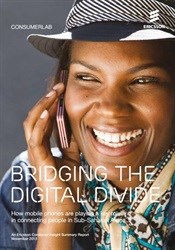Regional consumer insight report released by Ericsson

Ericsson's first regional consumer insight report, focusing on trends and analysis of the mobile ecosystem in sub-Saharan Africa, highlights how mobile phones create and promote connectivity in sub-Saharan Africa from the consumer perspective, covering topics regarding smartphones, the internet, financial services, and applications.
Though basic and feature phones still dominate the market, the research estimated that the smartphone will be key to enabling internet usage and an essential device in connecting personal and professional lives, as well as society at large. However, growth in the uptake of smartphones, which are presently seen as expensive, is expected to significantly increase, particularly with the anticipated introduction of a smartphone in the USD 50 price range.
Benefiting from an integrated ecosystem
While talking about the report, Shiletsi Makhofane, head of Marketing, Strategy, Government and Industry Relations, Ericsson sub-Saharan Africa said: "Our analysis shows that the entry of low-cost smartphone handsets in the market will allow people from different social classes to benefit from an integrated ecosystem.
"The smartphone will become key to accessing the internet, which we believe will change the regional status quo and enable a level of connectivity not seen before. Add to this the on-going installation of submarine cables and country/city fiber-optic networks across the continent, and we'll see a significant increase in the potential for connectivity and supporting infrastructure for greater data consumption."
Top three communication services
This ConsumerLab report also shows that the top three communication services used (other than voice) are sending/receiving SMS messages (72% of mobile users), social networking (44% of mobile users), and browsing the internet (43% of mobile users).
Smartphone users are driving internet use, and are showing strong interest in performing data-intensive mobile activities such as video calling, watching live TV shows, and streaming videos from channels such as YouTube.
For more, view the full report.


